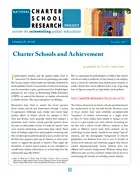This brief summarizes findings from The Effect of Charter Schools on Student Achievement: a Meta-Analysis of the Literature, a detailed assessment of the literature on student achievement in charter schools. Economists Julian Betts and Emily Tang analyzed studies of charter school performance published over the past decade. Their literature review focuses only on studies using one of two high-quality approaches— randomization based on lotteries, or taking into account a student’s past achievement through value-added modeling. Focusing on only high-quality studies increases the likelihood that conclusions will be valid. About two-thirds of the charter studies currently available were excluded from this review because there is strong evidence that weaker methods of study produce inaccurate findings.
When looking at studies that use methods powerful enough to give valid results, the authors find that:
- Charter elementary schools on average outperform traditional public schools in both reading and math, and that charter middle schools outperform in math.
- At the high school level, there is no overall significant effect of charter schools. But results vary by locality: in some locations charter high schools are outperforming, while in others they are underperforming.
- Urban charters seem to perform better than suburban or rural charters, especially at the middle and high school levels.
- KIPP schools appear to have a statistically significant and very positive influence on both reading and math achievement, with the effect size for math being twice as large as for reading.
- Examining all of these results as separate parts of a whole, charter schools look to be serving students well, at least in elementary and middle schools, and probably better in math than in reading.





